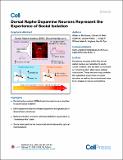Dorsal Raphe Dopamine Neurons Represent the Experience of Social Isolation
Author(s)
Matthews, Gillian A.; Nieh, Edward H.; Vander Weele, Caitlin M.; Halbert, Sarah A.; Pradhan, Roma V.; Yosafat, Ariella S.; Glober, Gordon F.; Izadmehr, Ehsan M.; Thomas, Rain E.; Lacy, Gabrielle D.; Wildes, Craig P.; Ungless, Mark A.; Tye, Kay; Matthews, Gillian A.; Nieh, Edward H.; Vander Weele, Caitlin M.; Halbert, Sarah A.; Pradhan, Roma V.; Yosafat, Ariella S.; Glober, Gordon F.; Izadmehr, Ehsan M.; Thomas, Rain E.; Lacy, Gabrielle D.; Wildes, Craig P.; ... Show more Show less
DownloadTye_Dorsal raphe.pdf (5.643Mb)
PUBLISHER_CC
Publisher with Creative Commons License
Creative Commons Attribution
Terms of use
Metadata
Show full item recordAbstract
The motivation to seek social contact may arise from either positive or negative emotional states, as social interaction can be rewarding and social isolation can be aversive. While ventral tegmental area (VTA) dopamine (DA) neurons may mediate social reward, a cellular substrate for the negative affective state of loneliness has remained elusive. Here, we identify a functional role for DA neurons in the dorsal raphe nucleus (DRN), in which we observe synaptic changes following acute social isolation. DRN DA neurons
show increased activity upon social contact following isolation, revealed by in vivo calcium imaging. Optogenetic activation of DRN DA neurons increases social preference but causes place avoidance. Furthermore, these neurons are necessary for promoting rebound sociability following an acute period of isolation. Finally, the degree to which these neurons modulate behavior is predicted by social rank, together supporting a role for DRN dopamine neurons in mediating a loneliness-like state.
Date issued
2016-02Department
Massachusetts Institute of Technology. Department of Brain and Cognitive Sciences; Picower Institute for Learning and MemoryJournal
Cell
Publisher
Cell Press/Elsevier
Citation
Matthews, Gillian A., Edward H. Nieh, Caitlin M. Vander Weele, Sarah A. Halbert, Roma V. Pradhan, Ariella S. Yosafat, Gordon F. Glober, et al. “Dorsal Raphe Dopamine Neurons Represent the Experience of Social Isolation.” Cell 164, no. 4 (February 2016): 617–631.
Version: Final published version
ISSN
00928674
1097-4172